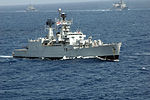| INS Brahmaputra (F31) | |
|---|---|
 INS Brahmaputra F31 departing Portsmouth Naval Base, UK, 20th June 2009 | |
| Career (India) | |
| Name: | INS Brahmaputra |
| Namesake: | River Brahmaputra |
| Builder: |
Garden Reach Shipbuilders and Engineers, |
| Commissioned: | 14 April 2000 |
| Nickname: | The Raging Rhino |
| Status: | Active |
| General characteristics | |
| Class & type: | Brahmaputra class |
| Type: | Guided-missile frigate |
| Displacement: | 3,850 Ton |
| Length: | 126.4 m |
| Beam: | 14.5 m |
| Propulsion: | 2 steam turbines delivering 22,370kW (30,000shp) to 2 shafts |
| Speed: | 30+ Knots |
| Range: | 4500 miles |
| Complement: | 440 to 450 (Including 40 Officers + 13 aircrew) |
| Sensors and processing systems: |
Radar • BEL RAWS-03 air/surface search radar • BEL/Signaal RAWL-02 (PLN 517) air search radar • Decca Bridgemaster/BEL Rashmi PIN 524 navigation radar Sonar • BEL HUMSA (Hull Mounted Sonar Array) • Thales Sintra towed array sonar Fire control • BEL Aparna radar (Kh-35 SSM) • Elta EL/M-2221 radar (Barak SAM) • BEL Shikari opto-electronic trackers (guns) |
| Electronic warfare & decoys: |
• BEL Ajanta Mk.2C Electronic Warfare system • ELLORA Electronic Support Measures system Countermeasures • 2 x chaff/flare launcher • Super Barricade chaff launcher • 2 x Graesby G738 or BEL TOTED towed torpedo decoy |
| Armament: |
16 x Kh-35 (SS-N-25) SSM (4 x quadruple KT-184 launchers) 24 x Barak SAM (3 x octuple VLS units) 1 x OTO Melara 76 mm gun 4 x AK-630 6-barreled 30 mm gatling gun 2 x RBU-6000 213 mm anti-submarine rocket launcher 2 x triple ILAS 3 324 mm torpedo tubes (Whitehead A244S anti-submarine torpedoes) |
| Aircraft carried: | 1 Sea King, 1 MATCH Helos |
INS Brahmaputra (F31) is the lead ship of her class of guided missile frigates of the Indian Navy. She was built at the Garden Reach Shipbuilders and Engineers (GRSE), Kolkata.
The design and construction of the ship is entirely Indian, and is a modification of the Godavari class of frigates.[1] It is fitted with an array of modern sensor suites and matching weapon systems. INS Brahmaputra was commissioned on April 14, 2000 by Captain Pradeep 'Billoo' Chauhan, VSM.
Presently commanded by Captain Philipose G Pynumootil, with Commander Rajat Gulati, Executive Officer, this 3,600-tonne ship is 125 metres (410 ft) long and can reach speeds of up to 30 knots. She operates the Westland Sea King helicopter and the MATCH (Multi Role Anti Submarine Torpedo Carrying Helicopter) helicopter, which is an ASW variant of the Chetak helicopter. The Brahmaputra is the second ship of the Indian Navy named for the River Brahmaputra.[2] The first vessel of the name was a Type 41 Leopard class frigate that was commissioned in 1958. The symbol of the Brahmaputra is 'The Raging Rhino', for the one-horned rhino native to the Brahamaputra valley.
Operations[]
Operation Sukoon[]
In July 2006, INS Brahmaputra under the command of Captain Kapil Gupta was a part of Task Force 54 on its return to India from the Mediterranean, when it was turned back to assist in Operation Sukoon. The task force consisted of three warships and a fleet tanker which were returning from a goodwill visit and were just about to cross the Suez Canal. After the evacuation, the task force remained on station in international waters off Lebanon, monitoring the conflict and ensuring the safety of remaining Indian nationals in Lebanon. The vessels left for their home ports on 10 August 2006.[3] during the 2006 Israeli-Lebanese conflict.
Task Force Europe 2009[]
During May–July 2009, INS Brahmaputra was a part of the Indian Navy task force on deployment to Europe. During this deployment, the task force participated in joint-exercises with the Royal Navy and the French Navy. Exercise Konkan-09 with the Royal Navy, was conducted off the coast of the United Kingdom.[4] Exercise Varuna 2009 with the French Navy was off the coast of France.[5]
Gallery[]
References[]
- ↑ "Type 16A Brahmaputra class". Bharat rakshak page on Brahmaputra class frigate. 2007-05-05. Archived from the original on 2007-12-11. http://web.archive.org/web/20071211202145/http://www.bharat-rakshak.com/NAVY/Brahmaputra.html. Retrieved 2008-01-28.
- ↑ "Indian naval ships visit to Greece". Embassy Of India, Athens. 2006-07-13. http://www.indembassyathens.gr/Defence/NOTE_INDIAN%20NAVAL%20SHIPS.htm. Retrieved 2006-07-27.
- ↑ "Two more warships sent to Lebanon to evacuate 850 more". IndianMuslims.info. 2006-07-23. http://www.indianmuslims.info/news/2006/july/23/india_news/two_more_warships_sent_to_lebanon_to_evacuate_850_more.html.
- ↑ http://indiannavy.nic.in/Press090612.htm
- ↑ http://indiannavy.nic.in/Press090615.htm
The original article can be found at INS Brahmaputra (F31) and the edit history here.

